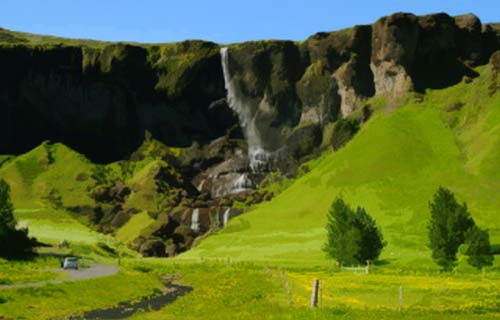
The name Atlantic is derived from the Greek God, Atlas. It is the second largest ocean covering almost 1/5th of the earth’s surface, and if you remember, it is where the Titanic, which was believed to be unsinkable, sank. In the movie, you might have seen the ship and a glimpse of Atlantic Ocean, so let’s know more about the Atlantic Ocean here.
It lies between the North and South America in the west and Europe and Africa in the east and extends over an area of more than 82 million square kilometres. The ocean runs north to south in the shape of an ‘S’ between these continents. The Atlantic Ocean touches the coastline of 65 countries and 33 territories in five continents, running to 111,866 km.
Towards the north between Newfoundland and Ireland, the ocean has a width of nearly 3,320 km but it narrows down to 2,850 km between Cape Sao Roque, Brazil and Cape Palmas, Liberia. As it travels more towards the southern part, it has its widest distance of 6,500 km from Cape Horn, southern Chile to the Cape of Good Hope, South Africa.
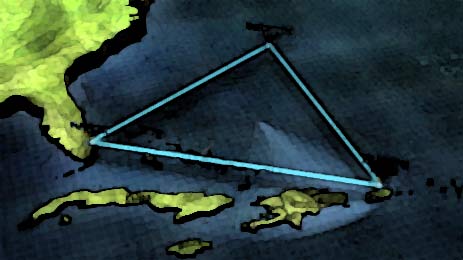
The notorious but unique Bermuda Triangle, where unexplained disappearances of ships, planes and people have occurred is located in the Atlantic Ocean. In 1866, the first successful telegraph cable was built under the Atlantic Ocean. The average depth of the Atlantic Ocean is 3,300 metres and its deepest point is the Milwaukee Deep which is 8,380 metres below sea level in the Puerto Rico Trench. Greenland is the biggest island and is located in the Arctic Ocean but there’s no greenery and it’s all covered with ice.
The equator divides the Atlantic Ocean into North and South Atlantic Ocean. The water at the equator remains warmer than any other region. The North Equatorial Currents spread the warm currents to the surface of the North Atlantic and the South Equatorial Currents spreads the warm currents to both the north and south Atlantic towards the eastern coast of both North America and South America. It heats up the surface of the Atlantic increasing the temperature. During summer the Atlantic Ocean reaches to a maximum of 15-20 degree Celsius.
With high temperature, rate of evaporation increases and hence salinity of the water also increases. Thus the North Atlantic water is saltier than any other ocean. Moreover, the inflow of sea water from the Mediterranean Sea drastically increases the salinity of the Ocean. In the North Atlantic Ocean, the Labrador Current carries a cold stream down till the latitude of 40°N and a hot Gulf Stream carries warm water far up the coast of Norway. Both the currents of extreme temperatures meet at a junction around the Grand Banks of Newfoundland which is known as the “Cold Wall”.
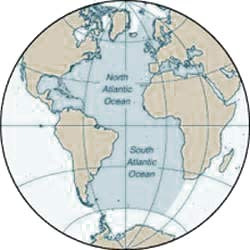
The biggest sea that flows into the Atlantic Ocean is the Caribbean Sea, which has an area of 2,753,157sq.km. The other major seas in this ocean are Baltic Sea, Hudson Bay, Norwegian Sea, North Sea, Scotia Sea, Irish Sea, Mediterranean Sea, Greenland Sea and the English Channel.
The life of Atlantic Ocean also comprises of various mammals, fishes and plants. Some of the major species found here are:
- Humpback Whales - They are omnivorous mammals which have a size of 14.6 to 19 metre and weigh nearly 36,000 kg. They also sing which may sound like moaning, howling or crying to us. They do so for hours to attract their mates. They are strong swimmers and the females always swim alongwith their calves for almost a year. Just like humans have finger prints, they have patches of white on the underside of their tail which is unique for each individual.
- Manatees - the Manatee is 4 metre in length and nearly 600 kg in weight. It can swim only at a speed of 8 km/h. They are herbivores; the calves survive on their mothers’ milk and the adults graze on grasses, sea weeds and algae. They rest frequently at the shores and also move very slowly which makes them vulnerable to the hunters.
- Sea Lions- These are carnivorous sea mammals which have a life span of less than 30 years. Nearly 2.2m long and weighing almost 400kg, this sea lion can hunt continuously for up to 30 hours. But each dive that they make lasts for only 3 to 5 minutes. They can swim at a speed of 40km/h.
- Atlantic Ghost Crab- This crab moves real fast. They are also known as sand crab and have four pairs of legs, with pair white claws. Its Latin name, Ocypoda, means swift-footed. They have hairs at the base of their legs which can soak up the water from the damp sand to wet their gills.
- Catfish - They have barbells, which are the fleshy filaments which protrude out of their mouths and thus gave a look like that of a cat and they are thus called catfish. The size of the catfish ranges from 1 cm to 12 metre.
- Starfish- They are invertebrates and carnivorous with a size of up to 24 cm and weigh almost 5 kg. They don’t have brain and blood. They have five arms and their nervous system is spread in these arms. They look like a star and they are not fish.
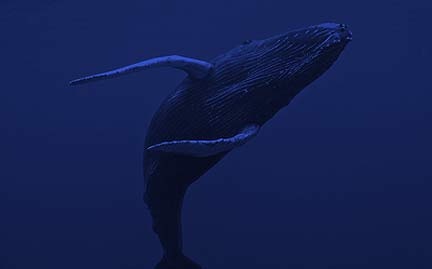
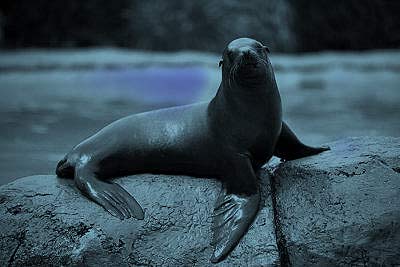
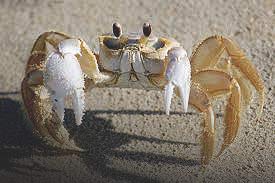
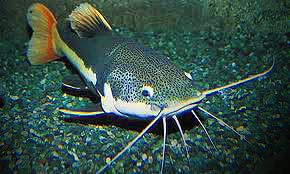
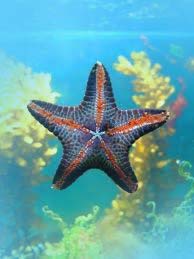
One of the most significant features of the Atlantic Ocean is the Mid-Atlantic Ridge. The Mid-Atlantic ridge is an underwater ridge that runs along the north-south direction in the center of the Atlantic Ocean. It extends for a length of nearly 10,000 miles with a width of roughly 1,000 miles. The mountains forming the ridge have their roots underneath the earth’s crust. Such underwater ridges protrude above the sea level sometimes and even form islands of nearly 50 to 75 miles wide.
- Iceland - This Island is located in the North Atlantic Ocean and to the east of Greenland. Though the name is Iceland but this island is full of greeneries. Only 1/9th of the land surface is covered by glaciers. It has over 10,000 waterfalls and 15 active volcanoes.
- Amelia Island Florida- This Island is just approximately 21 km long and 6 km wide. It is located to the south of Cumberland Island, Georgia and this island is named after the princess Amelia who was the daughter of King George II of Great Britain.
- Canary Islands- These are named after the Canes dogs found in the islands. They are located at the south-western coast of Africa.
- Falkland Islands- They are located in the South Atlantic Ocean to the east of southern Argentina. There are two major islands which are the largest; they are called East Falkland and West Falkland.
